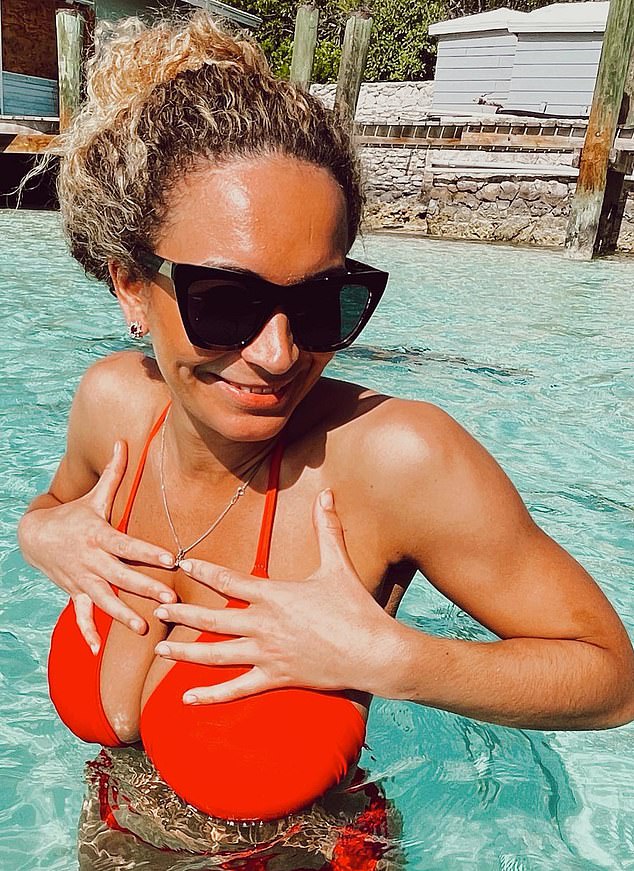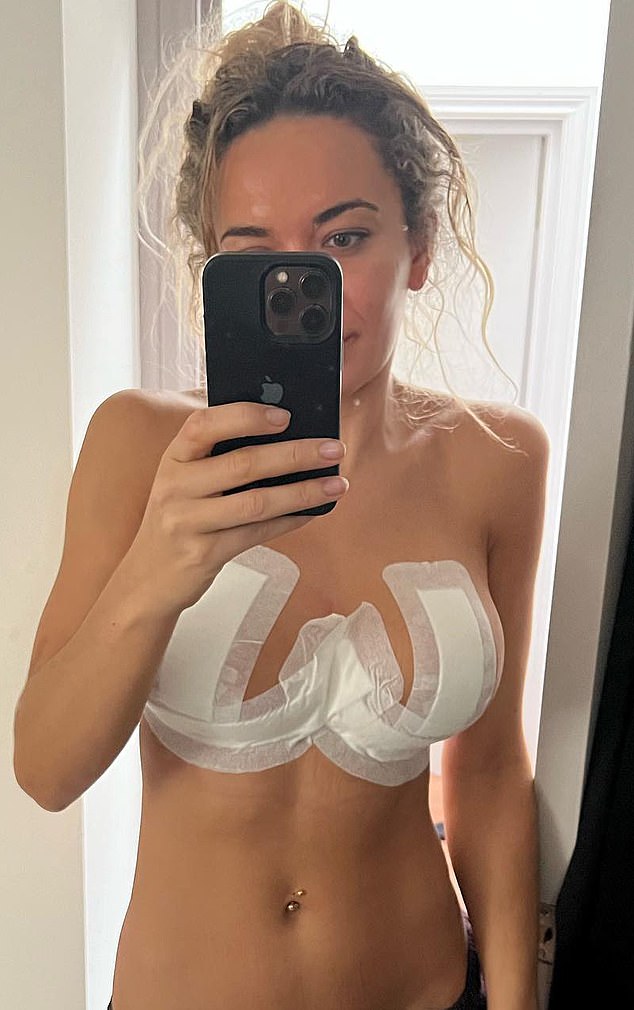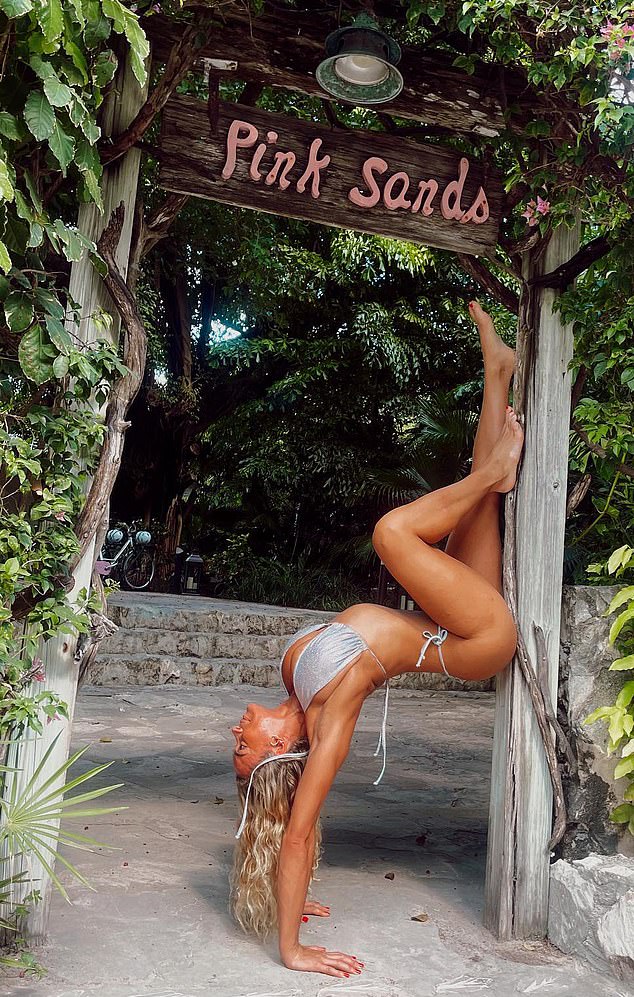My breasts regrew eight years after I had surgery to reduce them
Yoga teacher Echo Elliott’s Instagram profile is exactly what you’d expect, at least at first glance. Mostly, they’re photos and videos of the athletic 28-year-old in advanced yoga poses: leg behind head while doing a headstand, or an unlikely-looking backbend while balancing upside down on her forearms. Sometimes on a sunset-dappled beach. Those kind of things.
Perhaps even more unusual, she has spent the past few months charting her recovery from major surgery: In August, she underwent a breast reduction.
About 10,000 women undergo such an operation every year. It is a serious undertaking that involves removing tissue and reconstructing the breast, leaving significant scarring. It is usually performed to reduce the debilitating back pain caused by disproportionately large breasts, which was at least part of the reason for Echo.
What makes her case remarkable, however, is that it is not the first time she has undergone the procedure. To be clear: it is her second breast reduction.
Yoga teacher Echo Elliott has gone from a 30KK to a D cup twice
Echo, from Birmingham, had her first at the age of 21. The reason she had to get another one is because her breasts ‘grew back’ in the intervening years.
The first reduction brought her bust from 30KK – extremely heavy for her very slim 1.80 meter frame – back to a D cup. The result was “life-changing,” she says, freeing her from both physical discomfort and the gaze of men – and women – whose constant comments about her figure left her feeling excruciatingly self-conscious.
She set out to become a yoga teacher, but within a few years she noticed her breasts were getting bigger. By the time of her second surgery, Echo said they were “bigger than ever.” A second round of surgery freed her again.
Echo has decided to share her very personal story to highlight how beneficial breast reduction surgery can be – but also to let women know that in rare cases it may not be a one-off operation.
“I want to shed light on the difficulties women with very large breasts face,” she explains. ‘I have students who have large breasts and are considering a reduction. I hope they see what a good thing the surgery has been for me. Waking up every day and not being in pain, it’s magic. But I’m terrified they’ll grow back.’
Her case could also be a medical anomaly. After our interview, I discussed Echo’s case with leading breast surgeons and senior hormone physicians. No one had seen a similar patient.
However, everyone agreed that there were genetic and hormonal explanations for why something like this could happen.
Echo, who grew up in Leicester, says she was physically ‘a bit behind the other girls at school’, adding: ‘I was bullied because I was flat chested.
‘But I developed quickly at the age of 14, 15 and ended up receiving a lot of sexual comments from boys at school. And because I was curvy, I looked older than I was, so I also got a lot of attention from older men.
‘I was constantly aware of people looking at me, so I wore a big black hoodie that I just threw away. I lost all my confidence.’
Echo’s unhappiness with her body led her to try to slim down in the hope that it would reduce her bust.
“I just wanted them gone,” she says. ‘I was running a lot and going to the gym. I thought if I didn’t eat and exercise much I would be able to lose the weight and get it off my boobs, but that never happened.”
At the age of 20 and living in Birmingham, Echo visited her GP to discuss breast reduction after suffering from back and shoulder pain.
“It was like a constant dragging feeling between my shoulder blades,” she says. ‘It felt like my head was being pulled down. I got a headache and pain in my neck. During my period my breasts got bigger and the pain got worse.’
Her feelings of self-consciousness had also increased. ‘I didn’t like leaving the house, and I didn’t want to draw attention to myself. People just saw my breasts first. But the attention made me feel like they were the only attractive thing about me. It messed with my self-esteem a lot.”
Echo’s GP referred her to an NHS plastic surgeon who agreed to operate. “The surgeon was nice and agreed they were too big for my body,” she recalls. “If I could have done that, I would have absolutely fallen flat – I just wanted them gone – but he dissuaded me.”
Breast is made up of fat, glandular tissue – which makes breast milk – veins, arteries and connective tissue that holds everything in place.

Echo, pictured before her second breast reduction, went to Lithuania for the operation

After the second surgery, Echo thinks she has returned to a D cup
During a breast reduction, also called reduction mammaplasty, part of the bottom of the breast is removed. The nipple is also moved to a higher position.
There is, experts say, an art to the operation. Removing too little will defeat the purpose of the surgery, which is to relieve the discomfort of very large breasts. However, removing too much increases the risk of serious complications, such as compromising the blood supply to the nipple, which can lead to deformity or complete loss.
“Eventually he told me he wanted to get me up to a C cup, which I was happy with,” says Echo.
But after a year of waiting, just a week before the surgery was due to take place, it was cancelled.
‘I just cried. “I was devastated,” she says. ‘I immediately started looking for a private surgeon.’
The operation took six hours and recovery was difficult, she says.
‘There were a lot of bandages and I couldn’t lift my arms for weeks. I was in the hospital for a few days and then stayed on the couch.
‘I was staying with my partner at the time. If we were driving anywhere, every bump in the road would be painful.
‘I also had problems with one of my nipples, which meant I had to go back and forth to the hospital a lot.
‘When the swelling went down I was a D cup, not a C, but it felt small. It was life changing.
‘They didn’t make KK cup bras with a small enough width for me, so before surgery I was in a larger size that didn’t support me properly. After that I was able to buy a bra without much support and it just fit. I felt free.
‘I had been doing yoga since my early teens, but really started discovering movements that would help with recovery and care for my shoulders. It was wonderful to be able to move in a different way – everything had a new lightness.
“I didn’t think it was possible for me to do things like headstands and handstands, but after that first surgery it became an option.”
Four years ago, when Echo was 24, she noticed her breasts were growing again and the headaches and joint pain were returning.
“My weight had not changed and my lifestyle was the same,” she says. “But they just started to feel bigger.
‘During my period I also had terrible breast pain. I had to leave work because my breasts hurt, but even walking became uncomfortable.” The “looks” started again, she adds.

I didn’t think it was possible for me to do things like headstands and handstands, but after that first surgery it became an option, says Echo
Echo thinks her breasts have returned to their old size in 2021. ‘They felt even bigger and heavier. My back hurt and I started hiding in the black hoodie again.”
Last year she booked her second surgery.
“A customer came to me and told me she had gotten a discount,” she says.
“She showed me her scars and they were so faint compared to mine. I wrote down her surgeon’s details because I had to do something. It felt like my breasts were holding me back again.”
This time Echo went to Lithuania for the operation. Her bust has been reduced again to a D cup, and Echo is delighted once again. She decided to start posting on Instagram during her recovery, while still in her hotel room in Lithuania.
‘I couldn’t pretend that nothing had happened. I have about 150 students some days and they would see that I looked different. I also knew that some women in my class were going through similar things, and I wanted to share information with them.
‘Since the operation, and talking about how my breasts made me feel, women have apologized to me for judging me for the way I looked.
“People make assumptions, they sexualize you if you have bigger breasts.”
If she doesn’t welcome this kind of attention, why is she posting photos of swimsuits on her Instagram page, I ask.
“No one would blink an eye if I had smaller breasts,” she says. ‘But if you have larger breasts, you suddenly seek the wrong attention when you post a photo like that. I was fighting this internal battle, trying to be happy with my body and also feeling like I had to hide it.
‘Now I just want to normalize the fact that thousands of women are having this surgery.
‘One of my big concerns was that after a reduction I wouldn’t be considered attractive, or that men wouldn’t like my scars, but that’s not the case. I’m not ashamed of what I’ve been through and I don’t want it to remain hidden.’
She admits she hasn’t sought a medical explanation for why her breasts have grown again. But consultant plastic and reconstructive surgeon Rieka Taghizadeh, based at St Helens and Knowsley Teaching Hospitals NHS Trust, told me: ‘A case like this is as rare as you can get.
‘It is likely that the mammary tissue left behind after the first operation has increased in size, but it is difficult to speculate on the reason for this. Pregnancy, weight gain and menopause also affect hormone levels and therefore cause breast growth, but in this case none of these things apply.
‘One reason could be that a woman has very hormone-sensitive breast tissue for genetic reasons. I have seen this in younger patients who had had a reduction and then experienced some regrowth. Nothing to this extent, but it can happen.”
Considering the possibility of her breasts continuing to grow, Echo says, “This time the surgery was like a rebirth. I started therapy. “I’m trying to figure out who I can be without being ‘big-breasted echo’, which was kind of an affectionate nickname.”
I think this kind of language, no matter how light-hearted, has a corrosive effect. Echo agrees. ‘You wouldn’t talk so openly about any other part of your body. I also have big hair, but I wasn’t “Echo with the big hair.” You wouldn’t go up to someone with a flat chest and comment on that.
‘If they get too big again, I would consider surgery. When it happens, there’s no point in getting angry. But I also hope that as I get older, I can become more friends with my breasts.’
